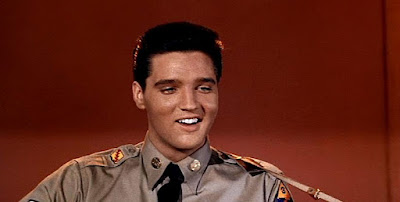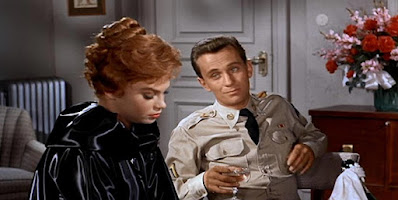 |
| Rita Hayworth and Burt Lancaster |
SEPARATE TABLES (1958). Director: Delbert Mann.
"I have no curiosity about the working classes." -- Mrs. Railton-Bell. |
| David Niven and Deborah Kerr |
 |
| Separate tables indeed |
 |
| Rita Hayworth and Burt Lancaster |
SEPARATE TABLES (1958). Director: Delbert Mann.
"I have no curiosity about the working classes." -- Mrs. Railton-Bell. |
| David Niven and Deborah Kerr |
 |
| Separate tables indeed |
 |
| Burt Lancaster |
In an absolutely gorgeous old house in Rome, there lives a professor (Burt Lancaster), a widower, who only wants to be left alone with his books, his art, and his housekeeper. An aggressive and vulgar woman, the Marchesa Brumonti (Silvana Mangano), importunes him to rent her the upstairs apartment for her daughter, Lietta (Claudia Marsani), Lietta's boyfriend Stefano (Stefano Patrizi), and the marchesa's younger lover, the German Konrad (Helmut Berger of Ludwig), who is also sleeping with Lietta. To his horror the professor discovers that this "family" is making wholesale changes to the apartment's very structure. In spite of his annoyance over this and other matters, the lonely professor comes to see these people as a surrogate family and seems to develop unspecified feelings for Konrad, who may not be as frivolous as he seems, leading to a literally explosive finale.
 |
| Aging gay prostitute? Helmet Berger as Konrad |
 |
| Patrizi, Marsani and Mangano on the professor's balcony |
Verdict: Hardly Visconti at his best. **.
 |
| Elvis with a not-quite-regulation haircut |
Soldier Tulsa McLean (Elvis Presley) and his buddies Cookie (Robert Ivers) and Rick (James Douglas) have a combo and hope to raise money to open their own nightclub back in the states. In Frankfurt Tulsa is importuned to try and win some money by taking part in a bet: he has to thaw out an ice maiden, a dancer named Lily (Juliet Prowse) and "be alone with her." Reluctantly, Tulsa begins romancing Lily, but he finds her so charming and attractive that guilt sets in. As Cookie and Rick deal with their own lovely ladies, Tina (Leticia Roman of The Spy in the Green Hat) and Marla (Sigrid Maier), Tulsa debates whether or not to break it off with Lily. But is he falling in love?
 |
| Juliet Prowse and Robert Ivers |
 |
| Elvis sings a lullaby for adorable baby |
Verdict: Why the public kept flocking to Elvis Presley musicals. ***.
 |
| Stewart Granger and Phyllis Calvert |
In 19th century London young Fanny (Phyllis Calvert of Madonna of the Seven Moons) is unaware that her father, Hopwood (John Laurie), isn't her real father, and that he owns the brothel next door. When he is killed by a disgruntled patron, Lord Manderstroke (James Mason), the truth comes out and Fanny and her mother are ostracized. Fanny eventually reunites with her biological father, a cabinet minister named Clive Seymour (Stuart Lindsell) whose marriage to Fanny's mother was annulled by the family. After another tragedy, Fanny draws close to her father's business partner, Harry Somerford (Stewart Granger), but his hateful sister Kate (Cathleen Nesbitt) may destroy their plans for a union. Then there is Lord Manderstroke, who keeps popping up in Fanny's life when she least expects it ...
Fanny By Gaslight, is a good, old-fashioned, British "will our Fanny ever find happiness" rags to riches tale that is absorbing, entertaining, and very well-played. In addition to the actors already named, there is also good work from Margaretta Scott [Crescendo] as Seymour's unfaithful wife, Alicia, and Amy Veness as Mrs. Heaviside, the loving servant and former nanny to Clive, among others. If the convoluted plot weren't enough, there are also hookers doing the can can, a ballet sequence, and a duel with pistols outside Paris. Although sinister Mason doesn't have that much screen time, he nearly steals the show. Anthony Asquith also directed The Browning Version and many others. Margaretta Scott and James Mason
Verdict: Solid cast in an engaging melodrama. ***.
 THE DELICIOUS LITTLE DEVIL (1919).
THE DELICIOUS LITTLE DEVIL (1919).  |
| Lidia Prochnicka as the baroness with Bergen |
 |
| Bill Fletcher (seated) with some of the ladies |
"I got expelled at school because I fell in love with one of the nuns." -- Stella.
Zee (Elizabeth Taylor) and Robert (Michael Caine of Dressed to Kill) have a toxic marriage that seems to run on ennui and liquor. At a party Robert meets the widow Stella (Susannah York), and while he hopes for just another cheap affair winds up supposedly falling in love with her. Zee seems to have a casual and world-weary reaction to this, but then comes to see Stella and her two small boys -- she and Robert can't have children -- as a threat. Robert makes up his mind to move out and have a life with Stella. What's a wife to do? Wondering exactly how old Stella might have been when she kissed a nun and got expelled at school, Zee pays a call on her when Robert is out ...
Frankly X,Y and Zee is over just when it starts to get interesting. For most of its length, it is a fairly dreary marital drama -- wife vs. mistress with a cad caught in the middle -- that has good performances and some good dialogue along with two-dimensional characters. Unlike the "bisexual" comedy Score, which came out the following year, X, Y and Zee turns coy and basically cops out at the end. Made only three years after Stonewall X, Y and Zee has a fairly negative attitude towards homosexuality, with stereotypical gay characters being referred to as "fags" (even right in front of them), so it's hard to think of it as ahead of its time (now if the trio had turned into a "thrupple!"). One also has to remember that Susannah York had already starred in The Killing of Sister George, which was much more explicit on lesbian matters and was released four years earlier.
 |
| Liz on the rampage! |
Verdict: Who's Afraid of Virginia Mayo? Heads in an interesting direction, and then completely muffs it. **.
 |
| Baleful Bette Davis |
 |
| Joanna Miles and David Ackroyd |
 |
| Michael O'Keefe and Rosanna Arquette |
 |
| Richard Egan and Joan Collins |
 |
| Caught between two loves: Collins with Rik Battaglia |